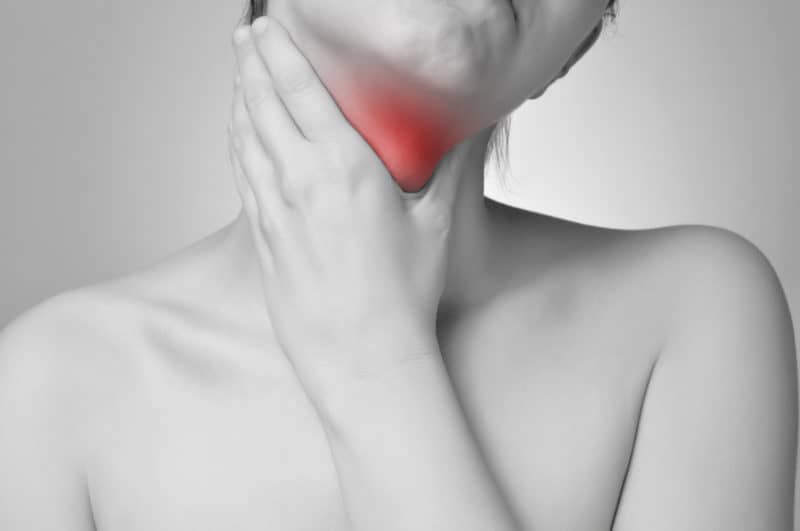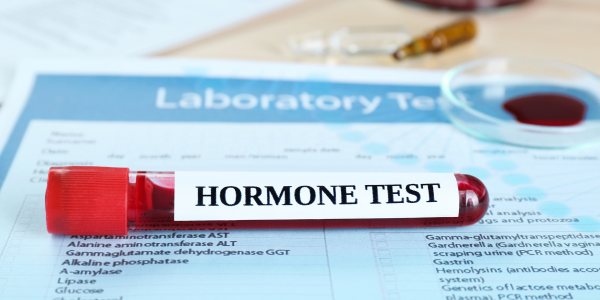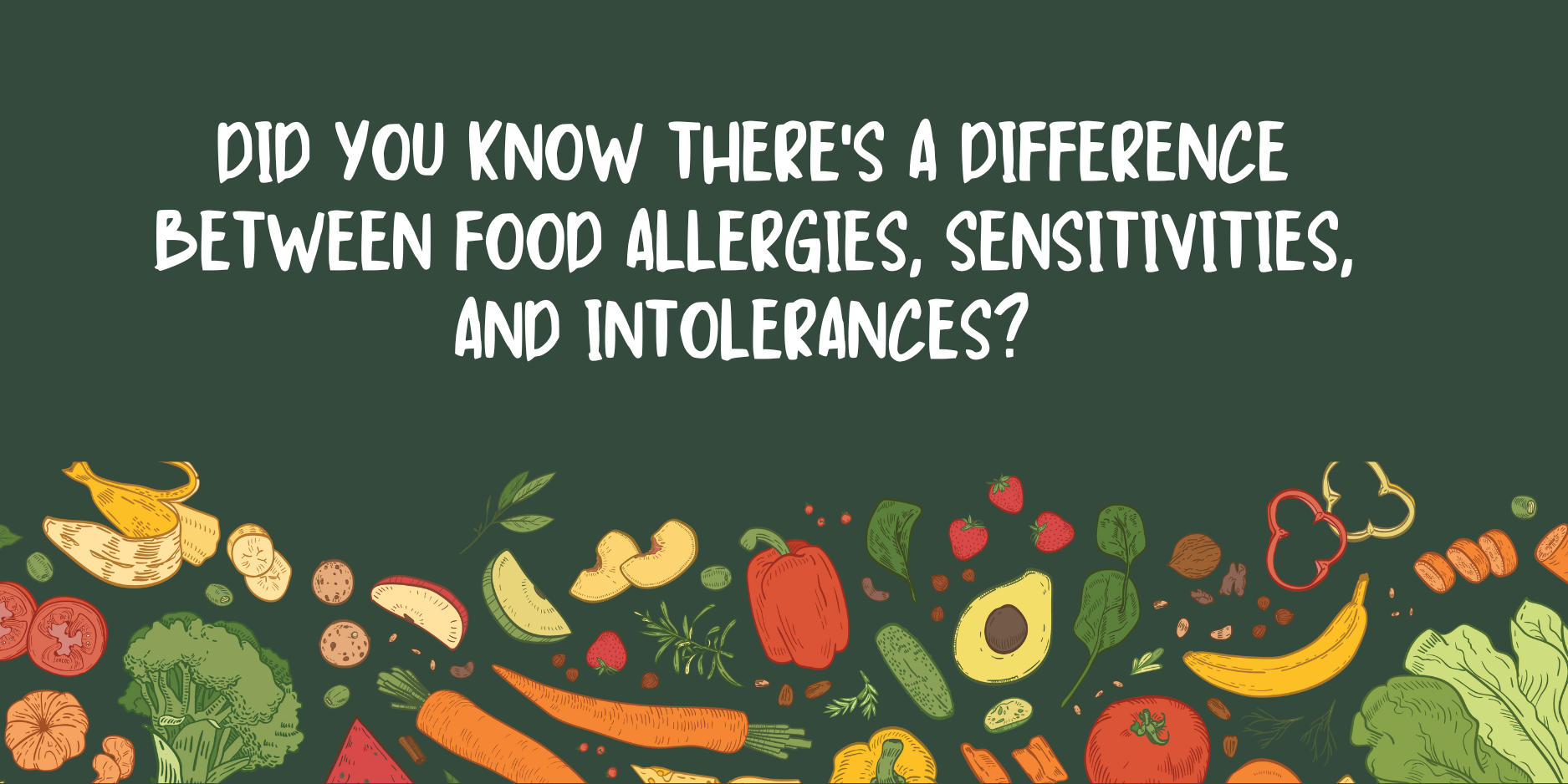

Your thyroid is a small, butterfly-shaped gland rests in front of your windpipe in your neck and is essential to thousands of processes throughout your body. It is especially important in metabolism, energy, and cellular growth. Your thyroid secretes several hormones, most notably thyroxine (T4) and triiodothyronine (T3), which are frequently measured by functional medicine providers. Most general practitioners will only look at the thyroid stimulating hormone (TSH) to screen for thyroid function, which unfortunately does not give the whole story. TSH is what the brain is telling your thyroid to do, it is not what the thyroid is actually doing, which is why checking other levels is important to get the full thyroid function picture. In addition, checking for thyroid antibodies to assess if there is an autoimmune condition going on is also important.
An estimated 12 percent of the population suffers from thyroid disorder at some point in their life – and women are eight times more likely to have thyroid issues than men. This doesn’t mean men don’t experience hyperthyroidism – in fact, a thyroid imbalance is often missed in men due to this association.
Initial symptoms of hypothyroidism are often attributed to ‘getting older’, or other medical conditions, and readily dismissed. Typically, a person with hypothyroidism doesn’t end up in a doctor’s office until their symptoms have seriously progressed or if there are coinciding conditions exacerbating the condition.
19 Signs You Have Hypothyroidism
When your thyroid isn’t producing sufficient thyroid hormones, it can cause a large number of symptoms. Here are the 19 most common signs of hypothyroidism:
- Fatigue
- Increased cold sensitivity
- Dry skin
- Puffy face
- Joint pain and stiffness
- Constipation
- Anxiety and Panic attacks
- Muscle aches and pains
- Muscle weakness
- Debilitating fatigue
- Carpal tunnel
- Irritable bowel syndrome (IBS)
- Hair loss
- Weight gain
- Mood fluctuation
- Memory difficulties
- Elevated blood cholesterol
- Low heart rate
- Irregularities in menstrual cycles
What many people don’t realize is hypothyroidism doesn’t typically just happen. There are root causes and compounding issues, which lead to an impaired thyroid response.
Sometimes the dysfunctional thyroid response is the body trying to protect itself. For example, when someone has experienced serious trauma and the thyroid responds in a protective fight-or-flight response, which over time can make you very sick.
6 Underlying Causes of Hypothyroidism
Most people with hypothyroidism have underlying causes, which contributes to their hormone imbalances. Some of the most common root causes include:
- Food sensitivities
- Nutrient deficiencies
- Impaired stress response
- Impaired ability to handle toxins
- Leaky gut (Intestinal Permeability)
- Chronic low grade infections
It’s possible to identify underlying causes and triggers of your personal thyroid condition and take the right steps to put it in remission.
Many doctors don’t know or talk about the possibility of putting thyroid conditions in remission, but there are countless stories of people who were able to do just that through carefully identifying their root causes and triggers and working to reduce their impact on their life.
7 Ways to Heal Your Hypothyroidism
The best way to heal your thyroid autoimmunity is to address the underlying causes – though these will vary slightly from person to person, here are seven common factors.
- Ruling out and eliminating agitating foods – Food sensitivities and food allergies can cause symptoms of hypothyroidism to worsen. You don’t have to have a dramatic reaction to foods to be impacted by them – a low grade allergic reaction to certain foods can cause inflammatory histamine to course through your body and significantly impact your daily life.
Try eliminating common allergens from your diet to see if there’s an improvement in your health. Eight items makeup up 90 percent of all food allergies:
- Peanuts
- Tree nuts
- Milk
- Eggs
- Wheat
- Soy
- Fish
- Shellfish
I recommend you try and at least eliminate gluten, dairy, and eggs because many thyroid autoimmunity patients report feeling better after eliminating one or more of these three food allergens. Plus, if you have an autoimmune thyroid condition, you will want to maintain at least a gluten and dairy elimination. If you are ready for a true autoimmune elimination, I recommend using Paleo AIP (autoimmune protocol) for a minimum of 30-60 days, with targeted re-introductions at the end to assess your true sensitivities. There are blood tests that can look at certain parts of the immune system response to foods, however, to date there is not one that looks at 100% of the immune system responses, thus elimination and reintroduction remain the gold standard.
- Supplement common nutrient deficiencies – You should get tested for nutrient deficiencies with your functional medicine doctor. Common nutrient deficiencies I see with thyroid disease, especially autoimmunity include:
- Thiamine and Riboflavin (B1 and B2)
- B12 and Folate
- Selenium, Magnesium, and Zinc
- Omega-3
- Vitamin D3 (combined with K2)
Keep in mind, you should also deal with any gut issues, as up to 80% of the immune system is located inside the gut. Sometimes patients are nutrient deficient due to poor digestion and absorption rather than a lack of nutrients.
- Consider your stress response – Adults who have experienced trauma are more likely to develop thyroid autoimmunity. The thyroid has an innate immune response that can sense danger and potentially trigger autoimmune reactions. Women who have been sexually abused are significantly more likely to experience thyroid autoimmunity.
However, a study of 125,000 patients with traumatic histories found that those who talked about their traumatic experiences as part of their medical history experienced a 35 percent reduction in doctor’s office visits and an 11 percent reduction in emergency room visits. Clinical studies have found that dealing with trauma can be incredibly helpful for the overall health of a patient, including in their stress and autoimmune response.
- Reduce your toxic burden – When you have hypothyroidism or any other form of thyroid dysfunction, it’s important that you reduce the amount of toxins in your life to support your liver’s natural detoxification process. Beyond detoxification, your liver is responsible for converting your T4 hormone to the active T3. You can support your liver and reduce your toxic burden by:
- Eat Organic food to avoid pesticide and GMO exposure
- Eliminating BPA containing plastics, and other toxic compounds in containers you are eating and drinking from (use only glass and stainless steel ideally)
- Cleaning out your personal care products – use the Think Dirty app or Skin Deep app to identify toxic items in your routine
- Using natural cleaning products
- Reducing consumption of fish high in heavy metals (ewg.org maintains a great list)
There are so many more toxins in today’s world than ever before. This is only the beginning in a toxin reducing protocol.
- Heal your gut – If you have underlying gut conditions such as leaky gut, it’s hard for your body to absorb the proper nutrients needed for you to get better. This is also true for anyone taking thyroid medication. Gut conditions are extremely common and it’s likely your gut health isn’t optimal. Work with your functional medicine doctor to heal your gut so everything else on this list works better for you.
- Treat low grade infections – Infections are a common trigger of autoimmune diseases. Some common infections associated with thyroid autoimmunity include:
- Epstein Barr
- Helicobacter pylori
- Streptococcal infectionsCytomegalovirus
- Lyme
- Mycoplasma
If you’ve been diagnosed with thyroid autoimmunity, you should have your doctor test you for infections.
- Add healthy fats to your diet – Low fat diets are extremely common among women and are not good for you. A recent study found, “high fat intake – including saturated fat – was associated with a reduced risk of mortality.” We are learning that fat intakes does not necessarily equal fat on the body. In fact, extremely low fat diets can cause your body to store and gain fat – exactly the opposite of what’s intended.
Your hormones need healthy fats for synthesis. So, please add more coconut oil, grass-fed butter, and avocados to your diet with my blessing. The only population that should be cautious of too much saturated fat is those with a known APOE 4 gene and high cholesterol.
No two autoimmune diseases are exactly the same – they have different underlying causes and present differently. Consider digging to the bottom and identifying your root cause instead of simply taking thyroid medication. While you may need some thyroid medication, you may find you need significantly less when you deal with root causes first – You can take your health back and feel better with a more personalized approach to thyroid dysfunction.
Share this article with a friend who would benefit from hearing about the different underlying causes of thyroid autoimmunity.
Resources:
https://www.ncbi.nlm.nih.gov/pmc/articles/PMC4044302/
https://www.healthline.com/nutrition/hypothyroidism-symptoms#section1
https://www.ncbi.nlm.nih.gov/pmc/articles/PMC3318917/
https://www.ncbi.nlm.nih.gov/pmc/articles/PMC3610444/
https://www.ncbi.nlm.nih.gov/pubmed/15866559
https://books.google.com/books?id=prmyDAAAQBAJ&pg=PA266&lpg=PA266&dq=125,000+patients+physicians++childhood+trauma&source=bl&ots=YyIaPZlLFL&sig=qyXDlLVNhFuPsXDcw81LLnclu6g&hl=en&sa=X&ved=0ahUKEwjdy6ne4PXWAhUY52MKHbSJCtAQ6AEIOzAE#v=onepage&q=125%2C&f=false
https://www.ncbi.nlm.nih.gov/pubmed/28864332
Share:
Social Media
Most Popular Posts
Subscribe To Our Newsletter
Related Posts

New Podcast Episode: My journey into functional medicine + what I’ve learned
I’m excited to share that I recently joined DeLo for Episode 165 of the On the DeLo podcast! In this conversation, we explored my journey

Understanding the Essential Labs for Women on Hormone Replacement Therapy (HRT)
So what are the minimum labs we’re looking at when we do hormone replacement therapy? We obviously want to look at an estrogen level, so

How to figure out the right amount of HRT in women
What about checking lab values when you’re on hormone replacement therapy? I do find it to be helpful, but we also want to consider symptoms.

Did you know there’s a difference between food allergies, sensitivities, and intolerances?
Did you know that there’s a difference between food allergies, food sensitivities and food intolerances? Food allergies, the reactions tend to happen pretty immediately and
